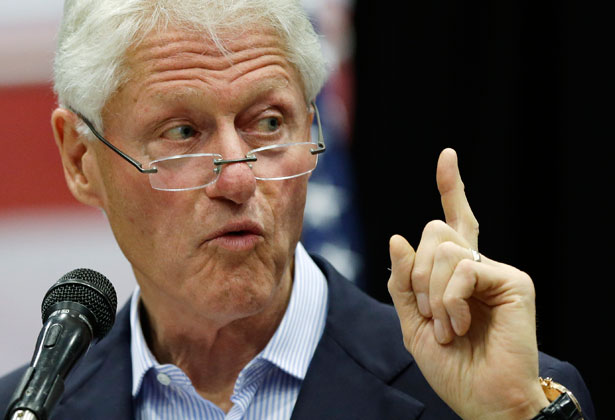
Former President Bill Clinton. (AP Photo/Eric Gay)
At a luncheon hosted Thursday by the Rev. Jesse Jackson’s Wall Street Project, former President Bill Clinton called for US multinational corporations to send home dollars banked offshore. He said taxes earned on up to 1.7 trillion repatriated dollars could be used to build a jobs-creating infrastructure fund.
The idea fit neatly with a theme echoed throughout the three-day, sixteenth annual Wall Street Project Economic Summit: reconstruction.
“Money reconstruction does not come from government, but using the power of government to inspire people to get involved will enforce future opportunities,” Jackson said in a press briefing Thursday morning.
Rev. Jackson, founder of the Rainbow PUSH Coalition, which organized the event, is calling for a modern-day “Marshall Plan” that would use low-interest loans to renew urban areas devastated by foreclosure and neglect. Jackson would fund such a plan with public pensions.
“Without access to capital, we will starve to death,” he told The Nation.
Jackson points to public pension investments in luxury retailers and Las Vegas hotels. He argues, If we can invest there, why not invest in communities hit hard by the foreclosure crisis?
Jackson supports building an infrastructure fund with repatriated corporate money. It’s estimated that between $60 billion and $90 billion in tax revenue is lost each year to offshore banking. US PIRG says that revenue could pay for Pell Grants for 10 million students or fund the construction of more than 800 rapid transit bus lines.
One estimate says US corporations bank $1.7 trillion overseas. The Nation reported in July that wealthy individuals hold as much as $21 trillion in offshore banks.
Despite a subtext of corporate misdeeds, no finger-wagging was directed at Wall Street executives in Thursday’s audience. That’s because the conference was meant to encourage Wall Street investment in minority businesses.
During the Access to Capital luncheon, a screen flashed logos of sponsors that included Bank of America and Wells Fargo, banks whose subprime lending practices, targeted at low-income communities of color, caused the crisis Jackson’s proposals seek to remedy. The banks received big bailout bucks, while targeted communities continue to flounder. JPMorgan Chase and Citigroup were also sponsors.
Words from GM CEO Walter Borst preceded Clinton’s speech. Philadelphia Mayor Michael Nutter also spoke, awards were distributed, and WE TV stars Mary Mary performed a duet.
Clinton urged small business owners in the audience to embrace new health care regulations. He called for investment in energy efficiency and STEM education.
Clinton clucked at foreign corporate income taxes he called too high and outlined incentives that could entice money back home. “If you will put 8 percent, 10 percent into an infrastructure bank to put America back to work, modernize our IT and other things, put people back to work, we will guarantee you a rate of return of 6 percent tax-free,” he said.
Clinton has endorsed a combined tax holiday and infrastructure bank plan in the past. Jackson’s coalition warns against tax holidays to incentivize repatriation, arguing that the last one, in 2005, did little to stimulate the economy. The document instead says that loopholes making offshore banking possible and profitable should be closed.
Clinton praised Wall Street for investing in community banks again. “Now with the banks going back to their core missions, I think they should be complimented and recognized and rewarded for it, by people saying that we believe in the capitalist system,” Clinton said. “But you can’t ever get this economy back to where it ought to be with this level of inequality.”
Katrina vanden Heuvel is in search of A Few Good (and Fair) Tax Hikes that would fight the US’s rampant inequality.


